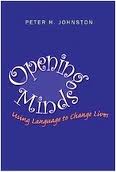Last year I read Opening Minds and Choice Words by Peter Johnston and participated in the #CyberPD online discussion about Opening Minds - click here to read my posts. After reading the book and discussing it with others online, I told myself that I was going to eliminate comments such as, "Great!"; "Good job!"; "Excellent!"because they are types of praise that are not specific and do not promote learning. I know most of us can probably admit to using these comments in our classrooms at some point. I am probably still guilty of using them, even when I vowed not to after reading Opening Minds. I try to always be aware of my word choice and catch myself, but I may still use them without even noticing.
For the past few weeks, I personally experienced what it feels like to be on the receiving end of these comments because my pilates instructor uses them in her classes. Each week, I go to pilates reformer classes at a nearby studio and as my pilates instructor walks around during class, she frequently says, "Perfect"; "You got it"; "Great job"; "Good job". I didn't think anything of it until I received a "Good job" one day as she was near my reformer and then immediately said, "Perfect" to the woman across from me. I could not help thinking, "What is she doing better than me to make it 'Perfect', while I am just doing 'good'?" Another time, she said, "Perfect" to me as she was near my reformer and now I kept thinking, "I wish she told me what I was doing to make it 'perfect' this time so I can make sure to do it like that all the time!" Receiving these comments made me think hard about how these comments must make our students feel and think. This week, I paid even closer attention to my choice of words when giving feedback to students and did catch myself a few times - it is hard sometimes not to use these comments, but it is critical that we try to be more specific in our feedback.
We have to always be aware of the power our words have in the classroom and the meaning that is conveyed to our students. For example, in Opening Minds, Peter Johnston wrote, "Saying 'I'm proud of you' to someone has the same effect as saying 'I'm disappointed in you.'" This made me realize that when we say, "I like the way..." we are giving other students the impression that we don't like what they are doing and the feedback is in the form of a judgement. Also if we say, "Good job" to one student but then say, "Excellent job" to another student, how does that make the first student feel? I admit I am still faulty sometimes of using person-oriented praise and am going to continue to work extra hard to give productive feedback that is process-orientated in my classroom.
I am thinking of having an open conversation with my class this coming week about feedback/praise and ask them to reflect on what they feel and think about when they receive general comments like, "good job." I am also thinking of asking them to help me continue to become stronger in giving specific, process-oriented feedback by asking me, "What makes it good vs. great or perfect?" if I ever give them a comment like that. I want them to advocate for themselves and call me out on it because I want my feedback to help them grow as learners, instead of making them feel like they are doing something wrong because they received a "good job" when someone else was told they are doing, "great, excellent, or perfect."
I'd love to hear your thoughts and about any strategies you use that help you give specific feedback to students that is process-orientated instead of the general praise.

No comments:
Post a Comment